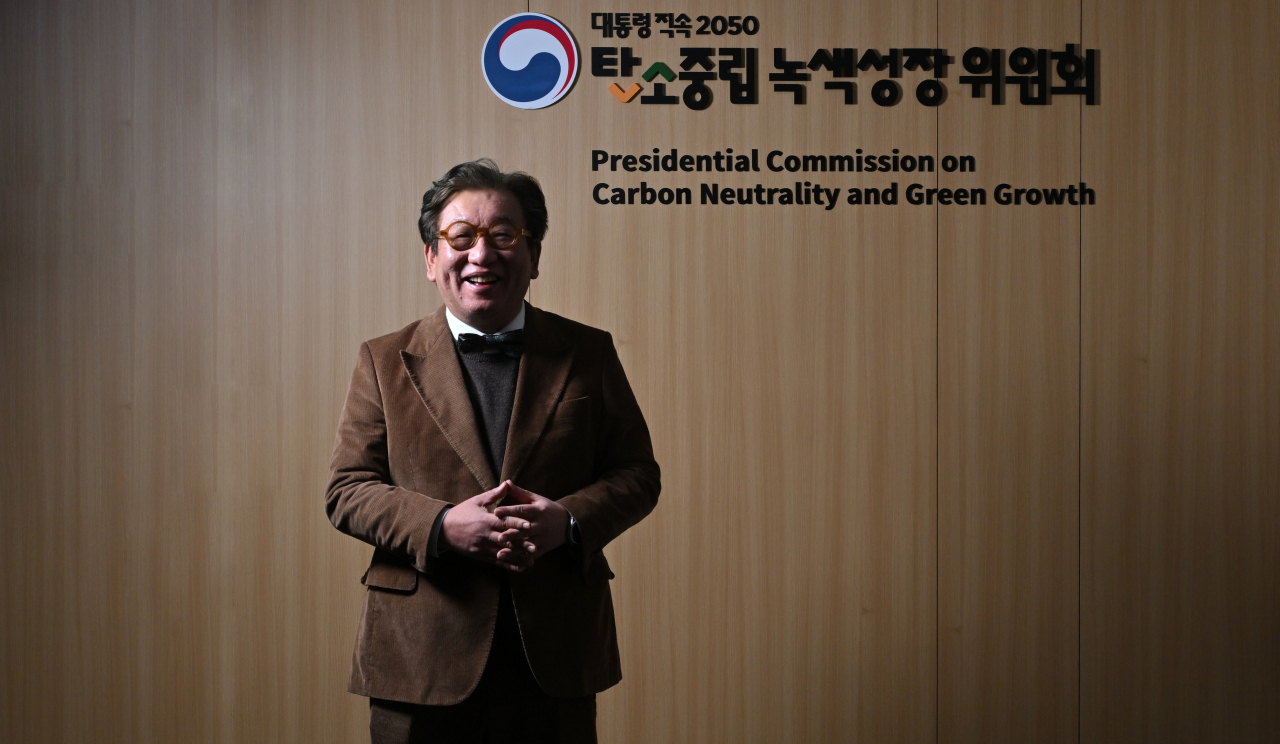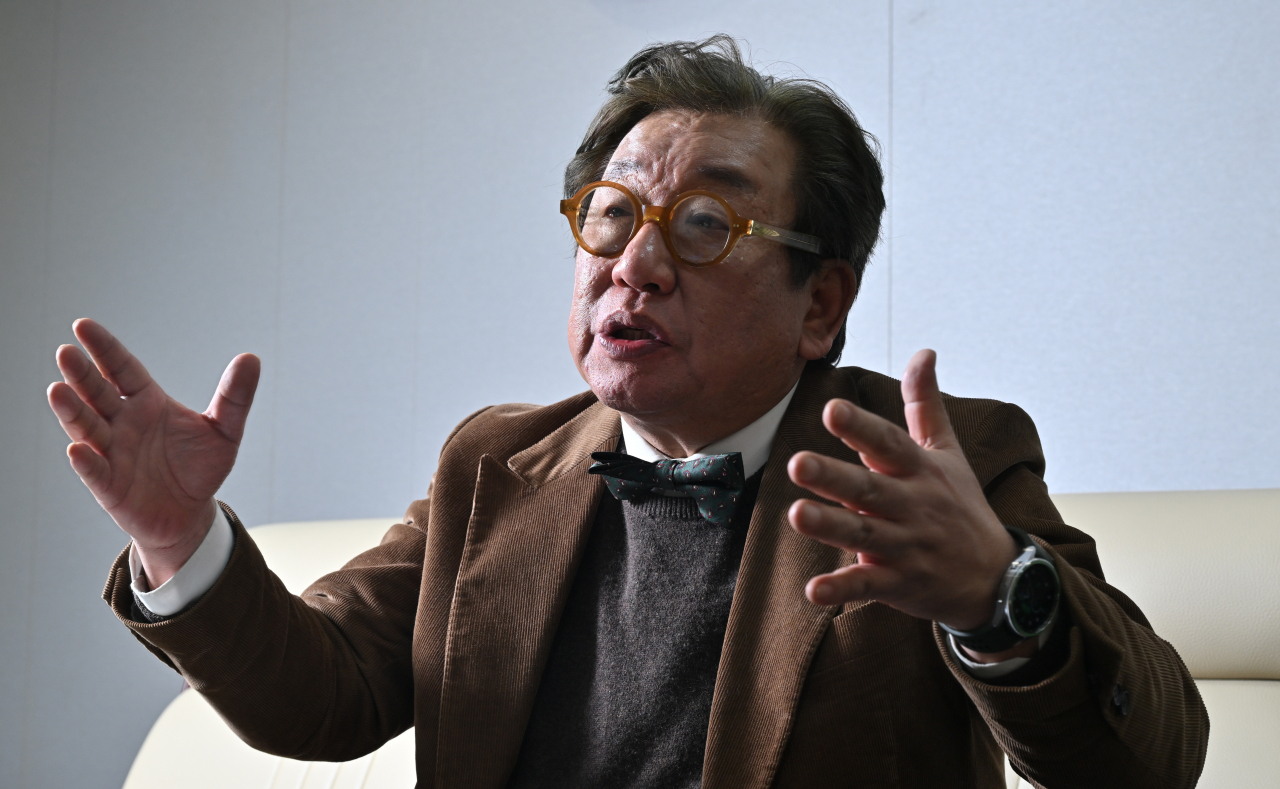 |
Kim Sang-hyup, co-chair of the Presidential Commission on Carbon Neutrality and Green Growth, poses for a picture during an interview with Herald Business and The Korea Herald on Mar. 28. (Im Se-jun/The Korea Herald) |
Kim Sang-hyup, co-chair of the Presidential Commission on Carbon Neutrality and Green Growth, said that the environmental crisis caused by climate change is “not something to consider for the distant future, but a current matter of survival for everyone.”
During an interview with Herald Business and The Korea Herald on Mar. 28, Kim mentioned that extreme weather events have recently become more frequent and that climate change has seriously affected people’s daily lives and the global economy.
According to the “State of the Global Climate 2022” report by the World Meteorological Organization released during the 28th UN Climate Change Conference (COP28), 2023 marked the warmest year since records began 174 years ago, with the average global temperature being 1.4 degrees Celsius above pre-industrial levels. Sea levels were also recorded to be the highest since satellite observations began.
In 2023, several countries around the world saw extreme weather events. Greece, Bulgaria and Libya were hit with tropical cyclones which resulted in flooding, leading to thousands of deaths, particularly in Libya. Countries like Italy and Morocco saw record-breaking heat waves, with average temperatures soaring to 48.2 C and 50.4 C, respectively. Canada also saw a record-breaking wildfire season in 2023, as more than 6,517 wildfires burned 18.5 million hectares -- over 10 times more than the year before.
South Korea has also seen a range of extreme weather events in recent years, including the flooding of areas near Gangnam Station, east coast wildfires in 2022 and the flooding of the Osong underpass in 2023.
Kim added that such events are “just a few examples that prove the severity of the current climate crisis.”
“Extreme weather events are continuously occurring and are causing significant loss of life and property,” said Kim.
“Beyond the impacts behind natural disasters caused by climate change, our societies, cultures and economies will be impacted overall due to health risks from new diseases, food shortages from reduced production of fish and agricultural products, the occurrence of climate refugees and creation of social inequalities,” Kim added. “These impacts will only grow stronger from here.”
For carbon neutrality, green growth
After reaching an agreement on transitioning away from fossil fuels at COP28, the government put forward a blueprint for introducing policies for carbon neutrality and green growth. According to Kim, it is the Commission’s responsibility to come up with a policy to achieve both.
For the first time since ratifying the UN Framework Convention on Climate Change, nuclear power, low-carbon hydrogen, and Carbon Capture, Utilization and Storage (CCUS) have been identified as tools for achieving the 1.5 C threshold in addition to renewable energy at COP28. The 1.5 C threshold was the stretch target established in the Paris Agreement in 2015 where almost 200 countries agreed to keep the global average temperature from exceeding a 2 C increase by the year 2050.
According to Kim, the addition of energy sources other than renewable energy confirmed that “all means must be mobilized from a technology-neutral perspective,” confirming a global paradigm shift regarding the 1.5 C threshold.
“To achieve carbon neutrality in 2050, the Commission will work to support the transition to carbon-free energy and the creation of new growth engines through related technology development and investment,” said Kim.
 |
Kim Sang-hyup, co-chair of the Presidential Commission on Carbon Neutrality and Green Growth, talks during an interview with Herald Business and The Korea Herald on Mar. 28. (Im Se-jun/The Korea Herald) |
Carbon Free Alliance
In September 2023, President Yoon Suk Yeol proposed during the 78th UN General Assembly the idea of creating a Carbon Free Alliance, an open platform designed to facilitate the widespread use of carbon-free energy.
Additionally, during his address to the APEC Summit in November, Yoon pledged that Korea would play a leading role in the expansion of global carbon-free energy usage.
Following Yoon’s creation of a Carbon Free Alliance, Kim stated that the Commission has seen a major paradigm shift in the international community in energy transitions.
“In a joint statement issued in February following the International Energy Agency’s Ministerial Meeting, energy and climate ministers recognized for the first time the importance of relying on nuclear power instead of fossil fuels. It also reflected on the need to promote the adoption of various carbon-free energy technologies tailored to each country’s conditions,” Kim said.
Kim added that the Commission plans to come up with a scalable system to recognize Korean firms’ various efforts in reducing carbon to promote the reduction of greenhouse gases, helping Korean firms become a standard to achieve carbon neutrality globally.
Meanwhile, Korea ranked eighth out of 76 countries in the Green Future Index report, released through the MIT Technology Review, where countries are evaluated for their future sustainability and low-carbon capabilities. Korea was also the only Asian country to be among the top 20 countries, making it one of the “Green Leader” countries in the report.



![[Weekender] Korea's traditional sauce culture gains global recognition](http://res.heraldm.com/phpwas/restmb_idxmake.php?idx=644&simg=/content/image/2024/11/21/20241121050153_0.jpg)



